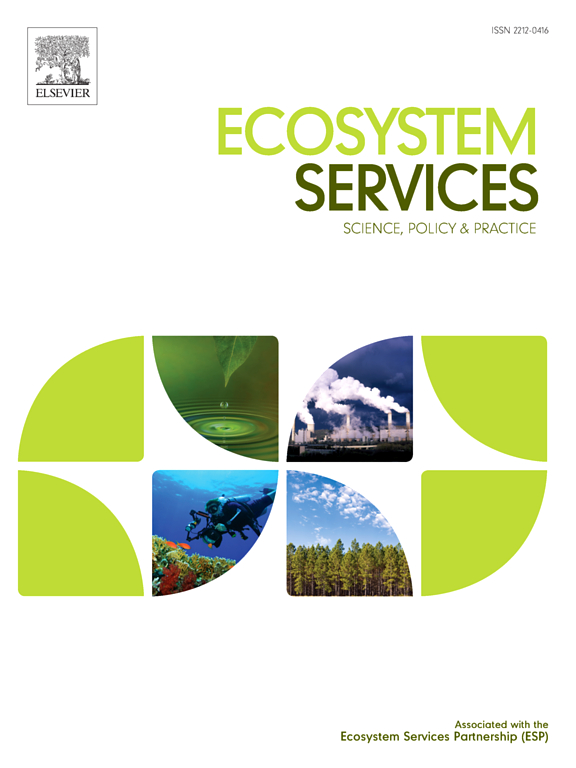A systematic literature review on the implementation of the System of Environmental-Economic Accounting-Ecosystem accounting in forests, cities and marine areas
IF 6.6
2区 环境科学与生态学
Q1 ECOLOGY
引用次数: 0
Abstract
The System of Environmental-Economic Accounting (SEEA-EA) was set as an international standard framework for integrating and relating economic and environmental statistical data. Since its adoption in 2021, several scientific efforts have been established to operationalise it. Systematic literature reviews are essential for providing a comprehensive worldview on specific topics, exploring gaps, and defining future directions. In this study, we systematically review ecosystem accounting studies in the context of SEEA-EA and collate information on several aspects of its multiple accounts: ecosystem extent, condition, ecosystem services and assets. To narrow the scope, we focus our research on three ecosystem types: urban, forest and coastal and marine ecosystems. The results showed an increasing interest in the topic among scientists. Most of the works were published between 2014 and 2024 (75 studies – 98.68%) and conducted in Europe and Oceania (61 studies – 80.26%). Ecosystem extent and services (monetary) were the most studied aspects; however, most studies do not compile information on opening/closing tables. The revised studies covered other ecosystem types besides the target ones (e.g., croplands). Extent accounts were compiled mainly using European and National land cover datasets. Condition accounts were mostly compiled based on compositional state characteristics, especially using biophysical indicators. Most studies failed to define reference conditions. Regarding ecosystem services (ES), most studies focused on physical and monetary accounts, using mixed methodological approaches. Most works assessed one section, primarily regulating & maintenance ES. Statistical data and market prices for biophysical and economic methodologies were preferred methods. Validation and mapping were not considered in the majority of the works. Future priorities, which are also challenges, on applying the SEEA-EA include developing guidance for (1) systematically defining appropriate reference conditions, (2) validating ES modelling outputs or at least reporting uncertainty levels, and (3) making the connection, often missing, between condition and ES accounts.
对森林、城市和海洋地区实施环境-经济-生态系统会计体系的文献综述
环境经济核算制度是作为综合和联系经济和环境统计数据的国际标准框架而设立的。自2021年通过以来,已经开展了几项科学工作来实施该计划。系统的文献综述对于提供关于特定主题的全面世界观、探索差距和确定未来方向至关重要。在本研究中,我们系统地回顾了SEEA-EA背景下的生态系统会计研究,并整理了其多个账户的几个方面的信息:生态系统范围、条件、生态系统服务和资产。为了缩小研究范围,我们将研究重点放在城市生态系统、森林生态系统以及沿海和海洋生态系统这三种生态系统类型上。研究结果表明,科学家对这一话题的兴趣日益浓厚。大部分作品发表于2014年至2024年之间(75篇研究,占98.68%),在欧洲和大洋洲进行(61篇研究,占80.26%)。生态系统范围和服务(货币)是研究最多的方面;然而,大多数研究没有汇编关于开/关表的信息。修订后的研究涵盖了除目标生态系统(如农田)之外的其他生态系统类型。范围计算主要使用欧洲和国家土地覆盖数据集编制。条件帐户大多是根据成分状态特征编制的,特别是使用生物物理指标。大多数研究未能确定参考条件。关于生态系统服务(ES),大多数研究集中在物理和货币账户,使用混合的方法方法。大多数作品评估一个部分,主要是调节&;维护ES。统计数据和市场价格是生物物理和经济方法的首选方法。在大多数工作中没有考虑验证和映射。在应用SEEA-EA时,未来的优先事项(也是挑战)包括制定以下指导:(1)系统地定义适当的参考条件,(2)验证ES建模输出或至少报告不确定性水平,以及(3)在条件和ES账户之间建立经常缺失的联系。
本文章由计算机程序翻译,如有差异,请以英文原文为准。
求助全文
约1分钟内获得全文
求助全文
来源期刊

Ecosystem Services
ECOLOGYENVIRONMENTAL SCIENCES&-ENVIRONMENTAL SCIENCES
CiteScore
14.90
自引率
7.90%
发文量
109
期刊介绍:
Ecosystem Services is an international, interdisciplinary journal that is associated with the Ecosystem Services Partnership (ESP). The journal is dedicated to exploring the science, policy, and practice related to ecosystem services, which are the various ways in which ecosystems contribute to human well-being, both directly and indirectly.
Ecosystem Services contributes to the broader goal of ensuring that the benefits of ecosystems are recognized, valued, and sustainably managed for the well-being of current and future generations. The journal serves as a platform for scholars, practitioners, policymakers, and other stakeholders to share their findings and insights, fostering collaboration and innovation in the field of ecosystem services.
 求助内容:
求助内容: 应助结果提醒方式:
应助结果提醒方式:


